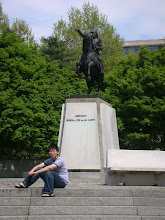
Dear Sirs and Madams,
With school out for the summer, I now have time to recognize how rewarding it was to write my term paper for Russian History. My interests have always been in Czarist Russia, but this essay forced me to examine the very individual that lies at the heart of our conception of the Soviet Union, the Big Brother himself, Stalin.
Essential in my paper were the observations on power and the state by the French Marxist philosopher Louis Althusser. The depiction of Stalin as simply deranged and insane is a popular one, but also an intellectually lazy one. I much prefer the assessment by Hiroaki Kuromiya, a very recent biogrpaher of Stalin, that Stalin’s flaw was not his irrationality, but rather his “subsumption of everything human under politics”. This in conjunction with Althusser's theory on the repressive state apparatus creates an interesting insight upon Soviet politics. The conclusion I have made goes against the popular musing of many apologists who assume that communism would have succeeded in the USSR had it not been for Stalin.
Khrushchev's Secret Speech against Stalin is most telling. Stalin's successor makes the conventional argument that Stalin was an insane individual who did not follow his own ideological convictions. Yet by continuing to condemn the opponents of Stalin (Kamenev, Bukharin, Trotsky, Zinoviev), Khrushchev makes a clear distinction between Stalin the person and Stalin the ideology. The deification of Lenin under a false narrative of Soviet economic history, praise for collectivization, and complete disregard for the famines betray Khrushchev's political motive in his portrayal of Stalin.
According to Althusser, in order for a state (or a class... perhaps the proletariat dictatorship) to constitute individuals as social subjects and maintain control, it has to maintain ideological legitimacy. The recreation and re-imposition of the unquestionable authority of the communist party in the post-Stalinist period required the repressive state apparatus (military, secret police, criminal justice, etc.) to be legitimate in the eyes of the people who had suffered tremendously. Stalin's initiatives and ideology could not be disestablished from the party line because Khrushchev, by being Stalin’s successor, was subject to the same framework of ideology and power. Khrushchev must have realized that to survive politically he could not undermine Stalin in his entirety.
Khrushchev bolstered the state apparatus by invoking Lenin’s rule which he depicted as a heroic one, consistent with ideological objectives (when in fact Lenin initiated the New Economic Policy, bringing capitalism back). He does not criticize the repressive state institutions of the Cheka or the NKVD because he required the repressive state apparatus to maintain the power centered around dogmatic centralism and unanimity of the party.
In short, Stalin’s temperament of eliminating political opposition was facilitated by the party doctrine and when unexpected resistance did rise, coercive and violent means were utilized at Stalin’s will. What made Stalin become portrayed as a monster is his calculation of everything in terms of power and body politics, but it was the Soviet system that allowed the gross human catastrophe to get so out of hand. I believe it is safe to say that the faceless system of power and the amoral state apparatus is as culpable as any one individual.
Voters, accountability is not just for the Russians.
Best,
Yong Kwon




